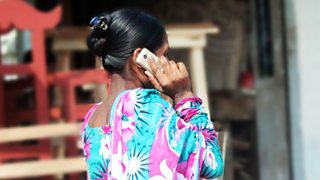Bangladesh TV drama to tackle antenatal care
Md Al Mamun
Senior Research Officer in Bangladesh for 主播大秀 Media Action
Tagged with:
Too many women die every day for no other reason than bringing a new life into the world.
Are these deaths due to lack of knowledge? Is it a shortage of health facilities, or poor social support for pregnant women and new mothers?听
What I have learned in my role as a researcher stems from the words and experiences of women and their families. Failure to access antenatal care contributes hugely to maternal mortality and morbidity in developing countries.
To understand what is preventing people from getting antenatal care, I, along with the rest of our team, have visited many districts in Bangladesh and talked with a huge range of people: pregnant women, mothers, fathers/husbands, mothers-in-law, frontline health service providers, doctors and community and religious leaders.
Mothers-in-law play a powerful information role
The barriers soon become clear - and the biggest barrier is lack of knowledge: most rural people do not know they need antenatal care. Only when a pregnant woman faces a health complication will she visit a medical facility. Young women don鈥檛 have the confidence to take up antenatal care without family support; mothers-in-law think that, since they gave birth without it, their daughters-in-law don鈥檛 need it either.
Improving knowledge, it's clear, should be a goal. Finding the right way to reach women and their families is the first step. 主播大秀 Media Action in Bangladesh carried out focus group discussions with target audiences - mothers, fathers/husbands, mothers-in-law and one to one in-depth interviews with pregnant women.听
We found that TV was the most popular medium among these audiences and most watch TV drama regularly. The research, in fact, backed up our original assumption: because of its wide reach, (approximately 74m viewers), a TV drama would be the most powerful way to reach our target audience.
This drama - due to launch early in 2014 - will be reinforced by public service announcements and factual programming tackling women鈥檚 lack of confidence, challenging the attitudes of mothers-in-laws and encouraging husbands to take an active role in taking up antenatal care.
听

Mobile phones can reach those without TV access
But TV, however powerful, does not always reach the most marginalised Bangladeshi woman.
This is the woman living in the remote regions of Sirajgong Char, Sunamgong Haor and Khulna Coastal belt who has little education and poor access to media. In Sirajgong Char there is no electricity grid – and only five out of 154 households have TV, thanks to solar energy. A proportionately higher number - 55 households - have mobile phones. This woman must walk three kilometres and cross a river to reach the nearest health facility and she has never been to see a doctor without her mother, husband or mother-in-law.
The challenge is to design a media campaign to reach her.
The comparatively high penetration of mobile phones, even among the most excluded groups means that making health information available via mobile phone (known broadly as mHealth) presents a great opportunity to close this knowledge gap. Other possibilities include presenting information through folk songs, posters, and travelling vans which show videos in public places.
mHealth on the policy agenda
Mobile phones are accessible to 90% of the world’s population and 80% of the rural population. In recognition of this, mhealth services were firmly on the agenda at the recently-concluded in Arusha, Tanzania. At sessions I attended, the majority of researchers, policy makers and health experts from 59 countries agreed that innovative use of this technology could help to deliver quality care, even for the most marginalised people.
After presenting findings from our study at the conference I headed back to my hotel when my eyes were drawn towards the peak of Mount Meru. Clouds had started to mass around it, partially hiding it from view. This sparked a thought: clouds may try to hide the mountain but its immensity will not allow it to be hidden for long.
Barriers exist but they can be removed.
We should never let the scale of a problem make us think it's too big to deal with. And we should not have 800 mothers dying a day as a result of them giving us new lives.
Related links
